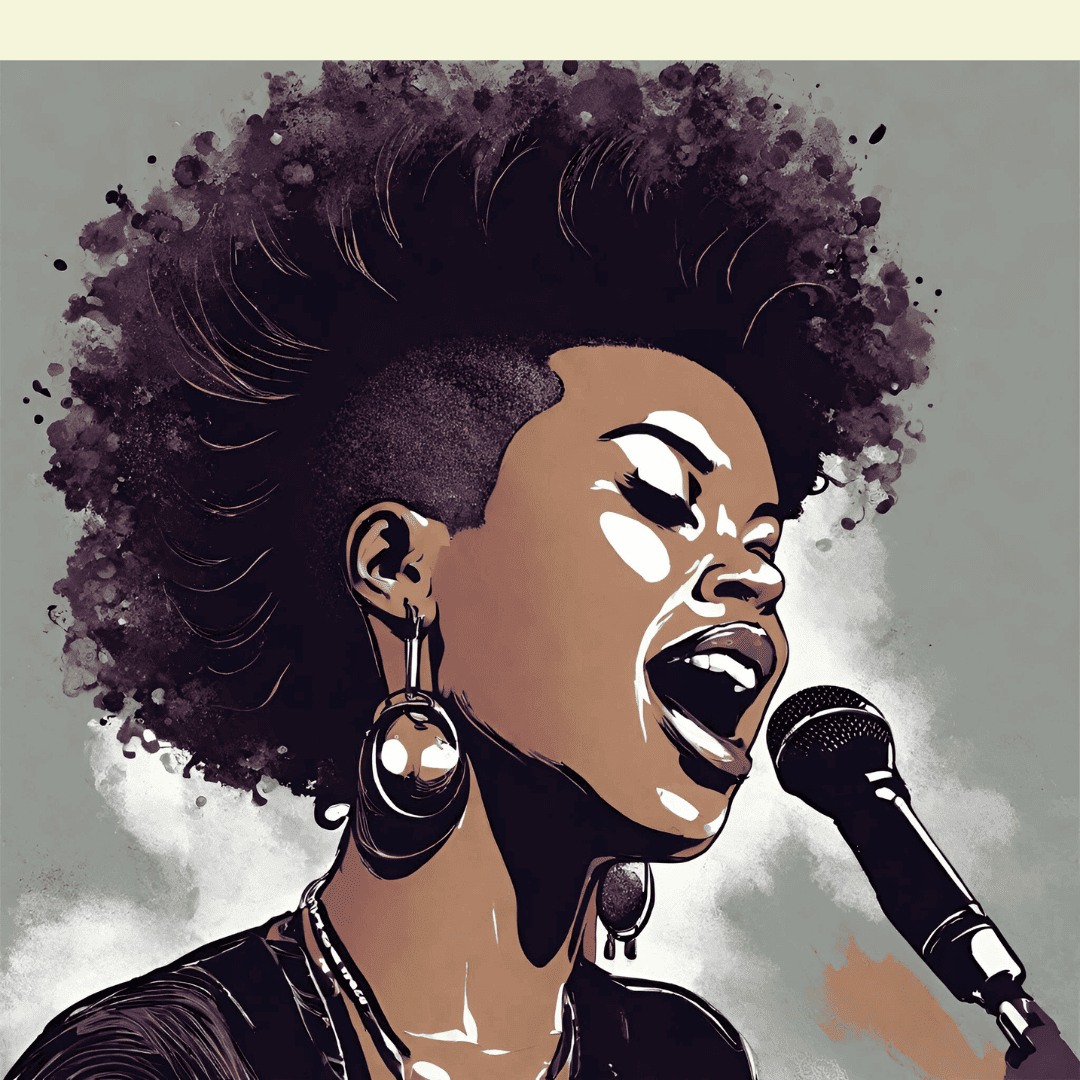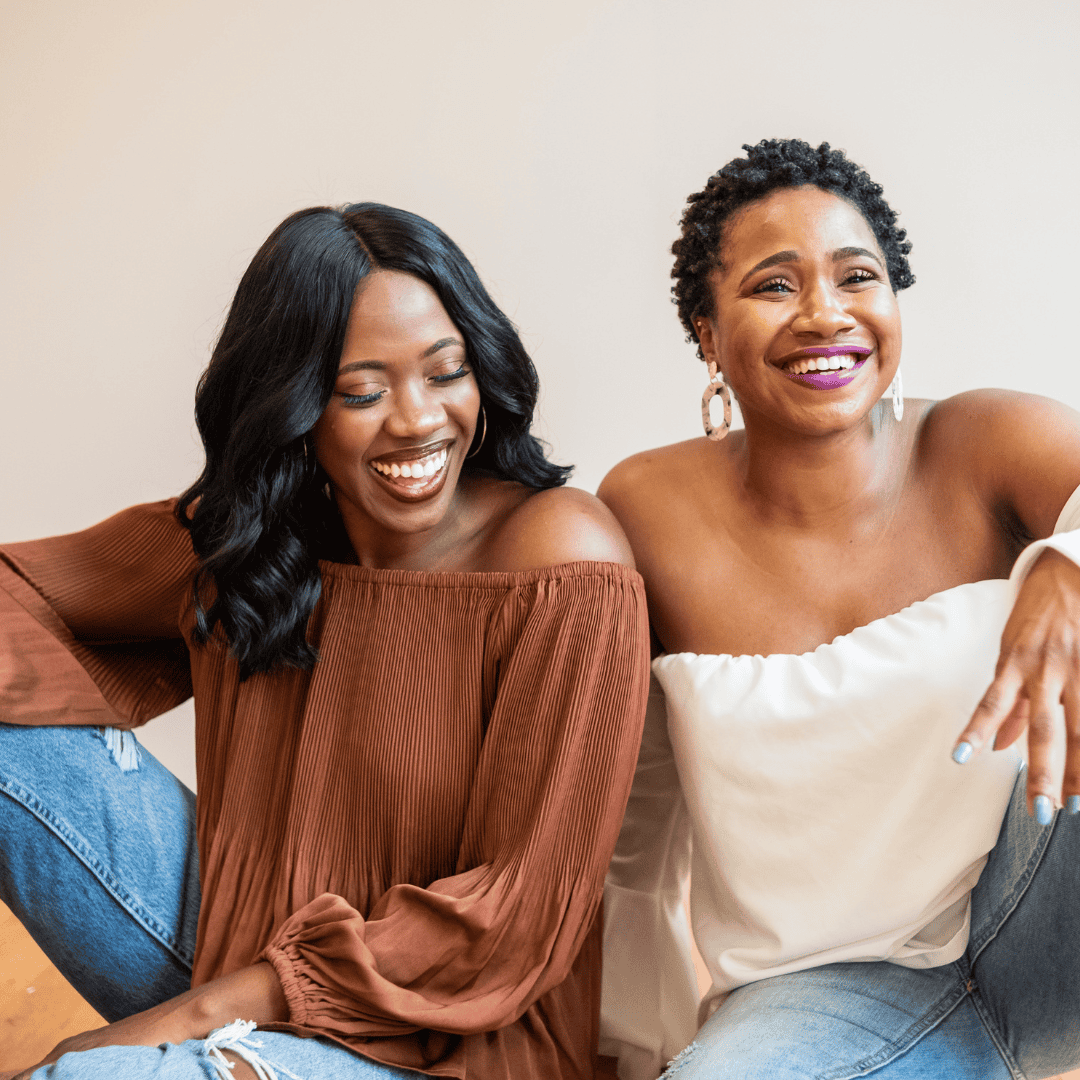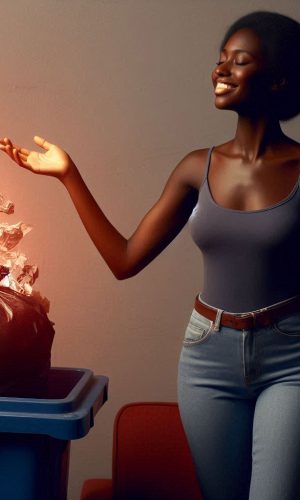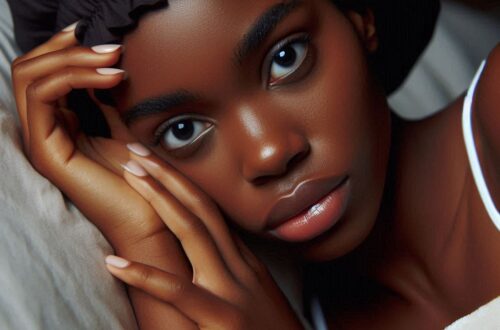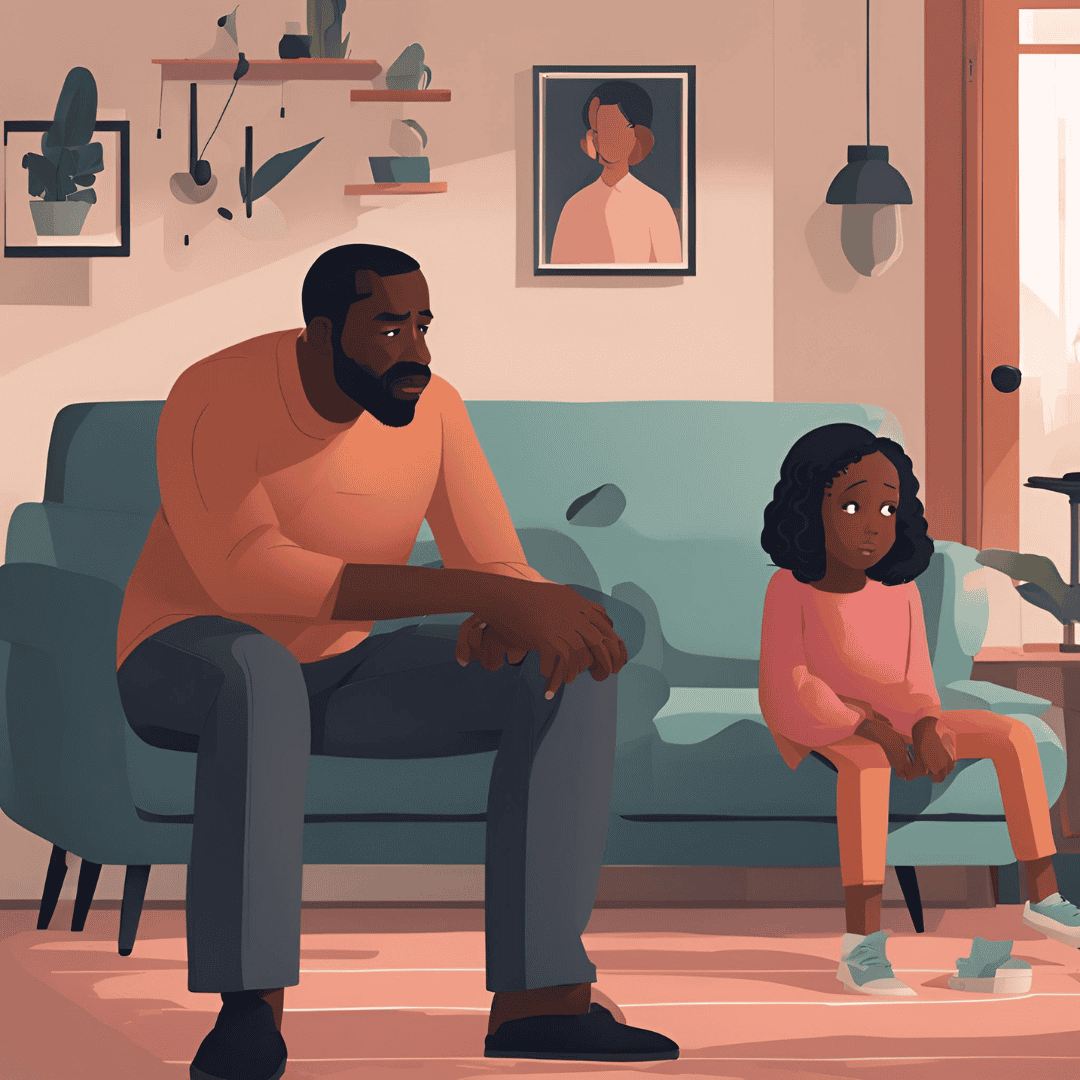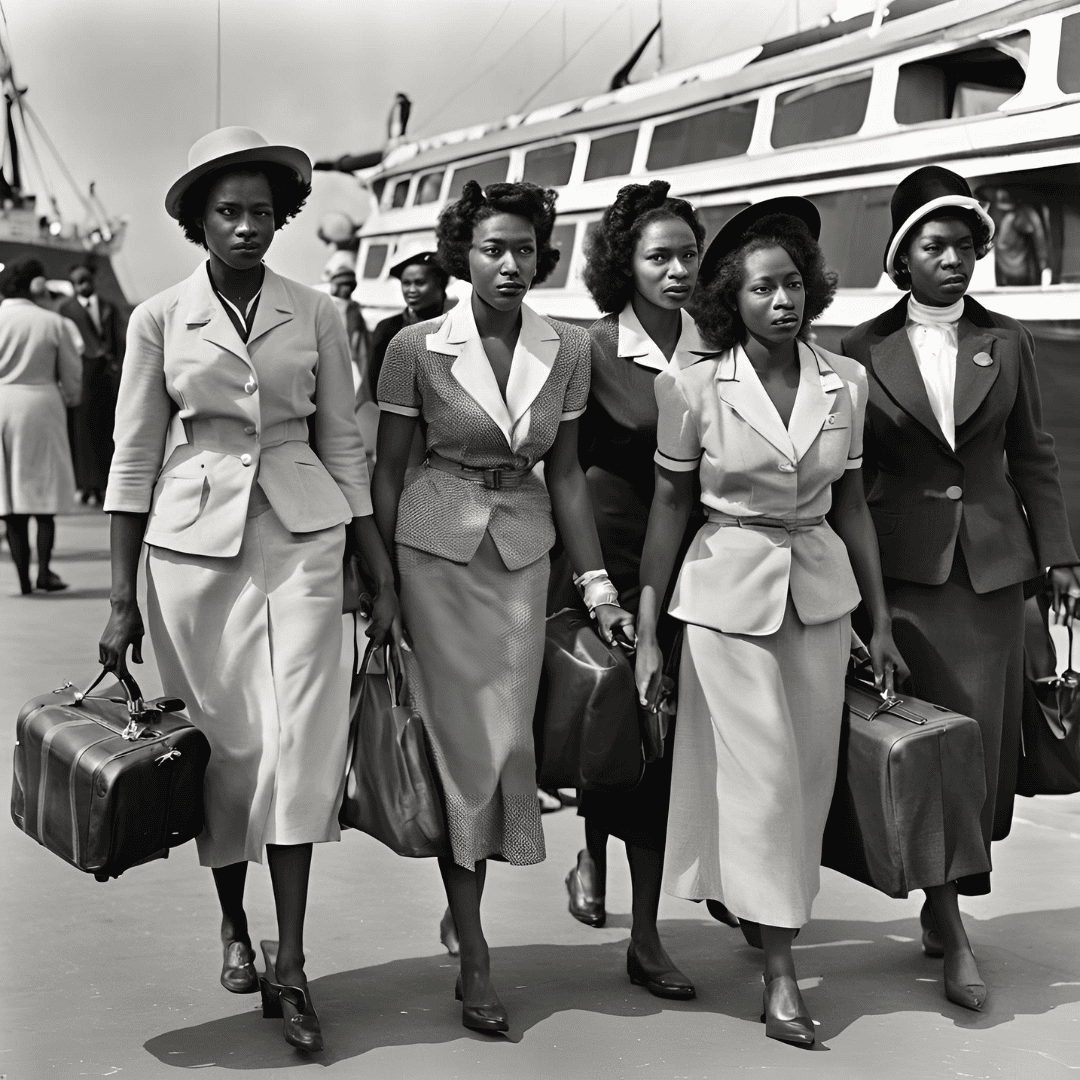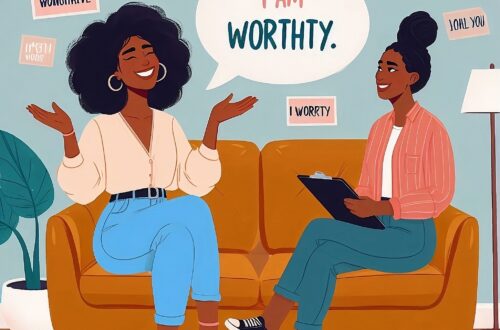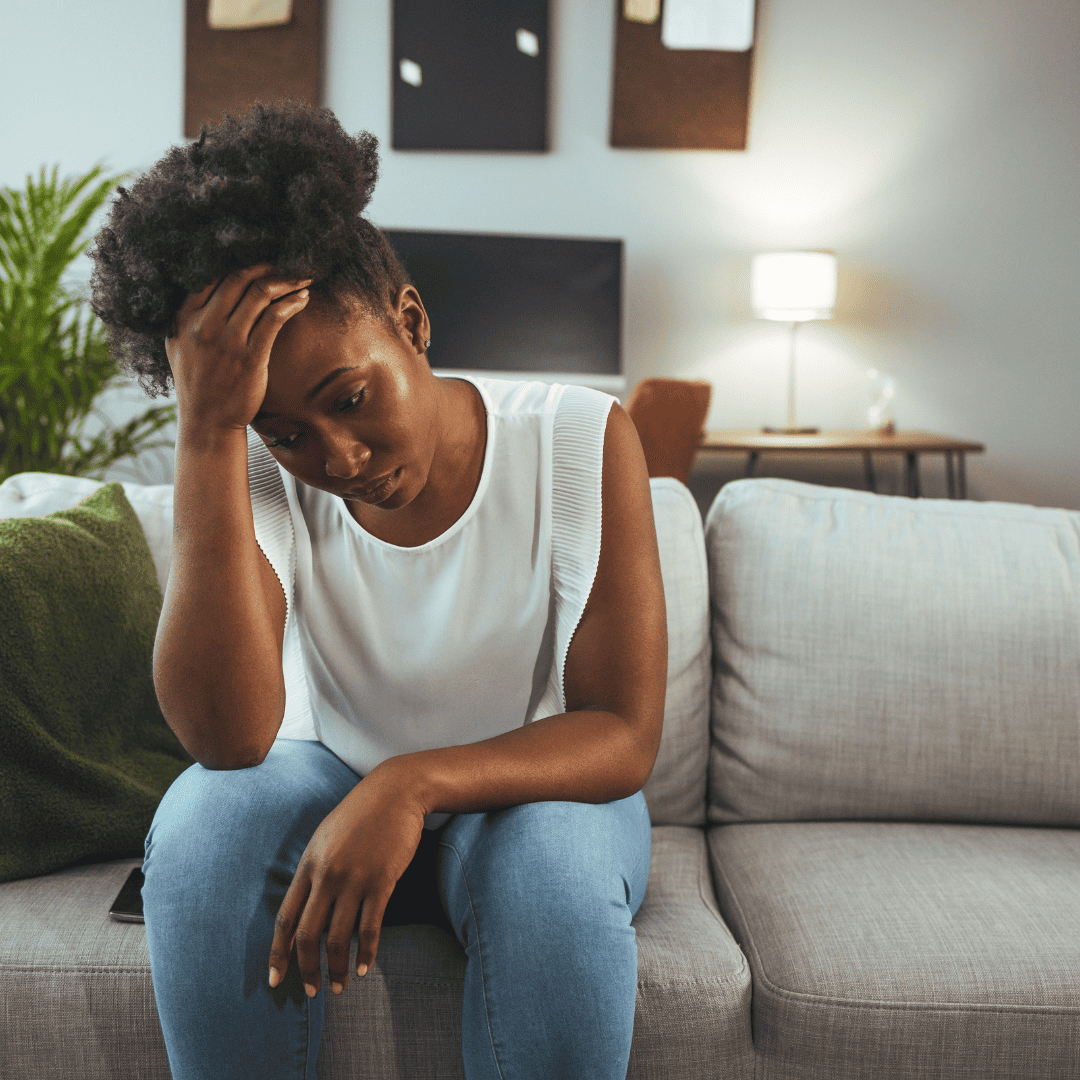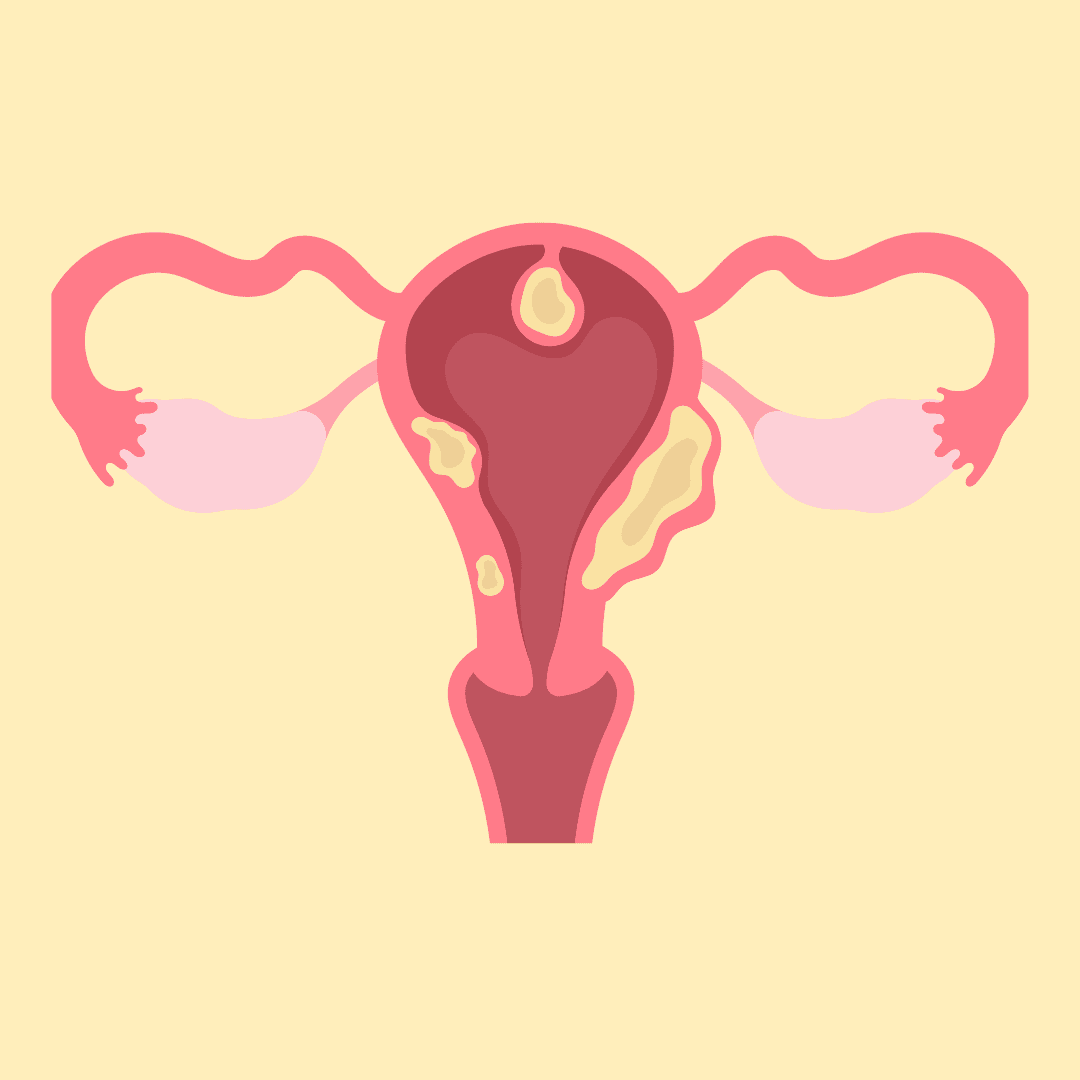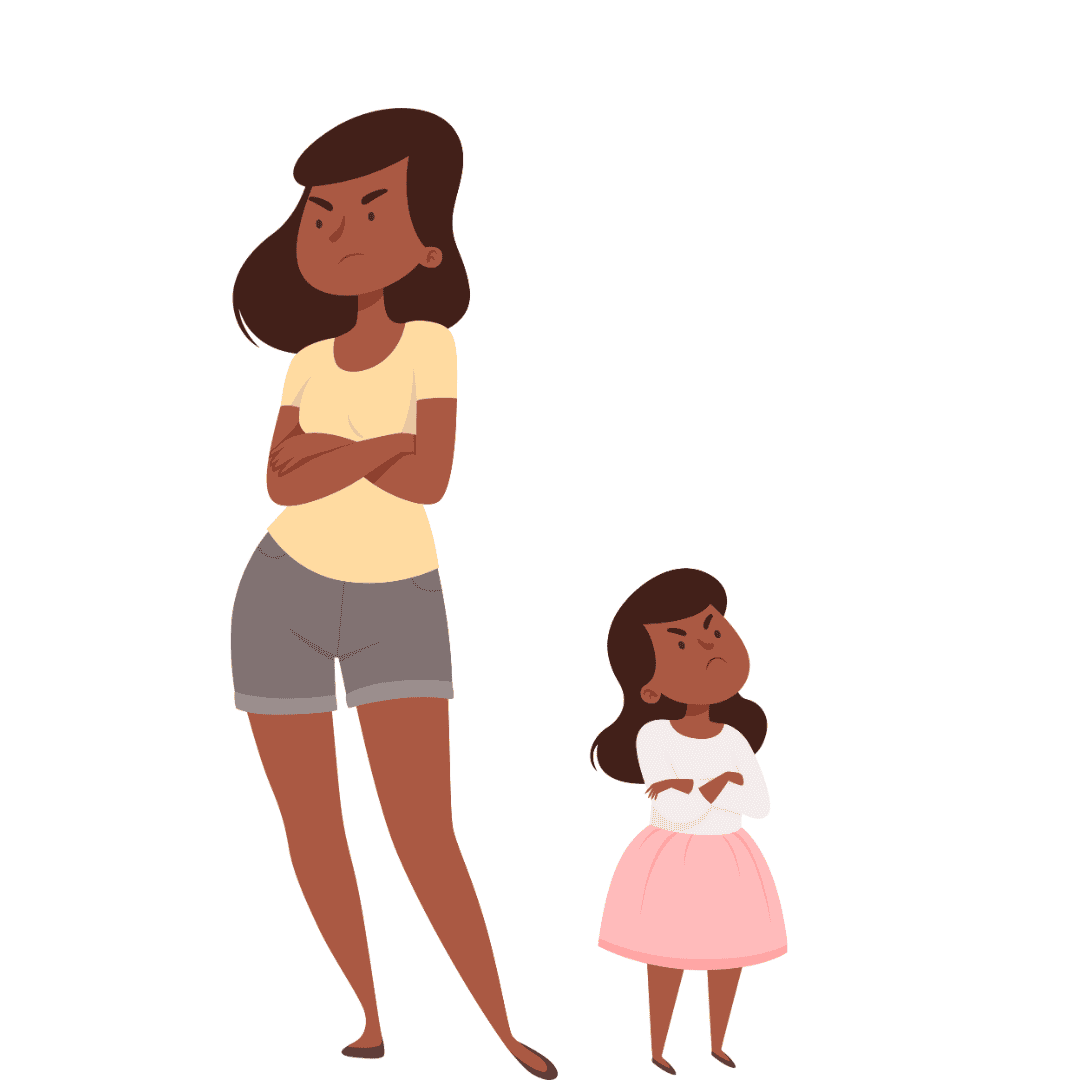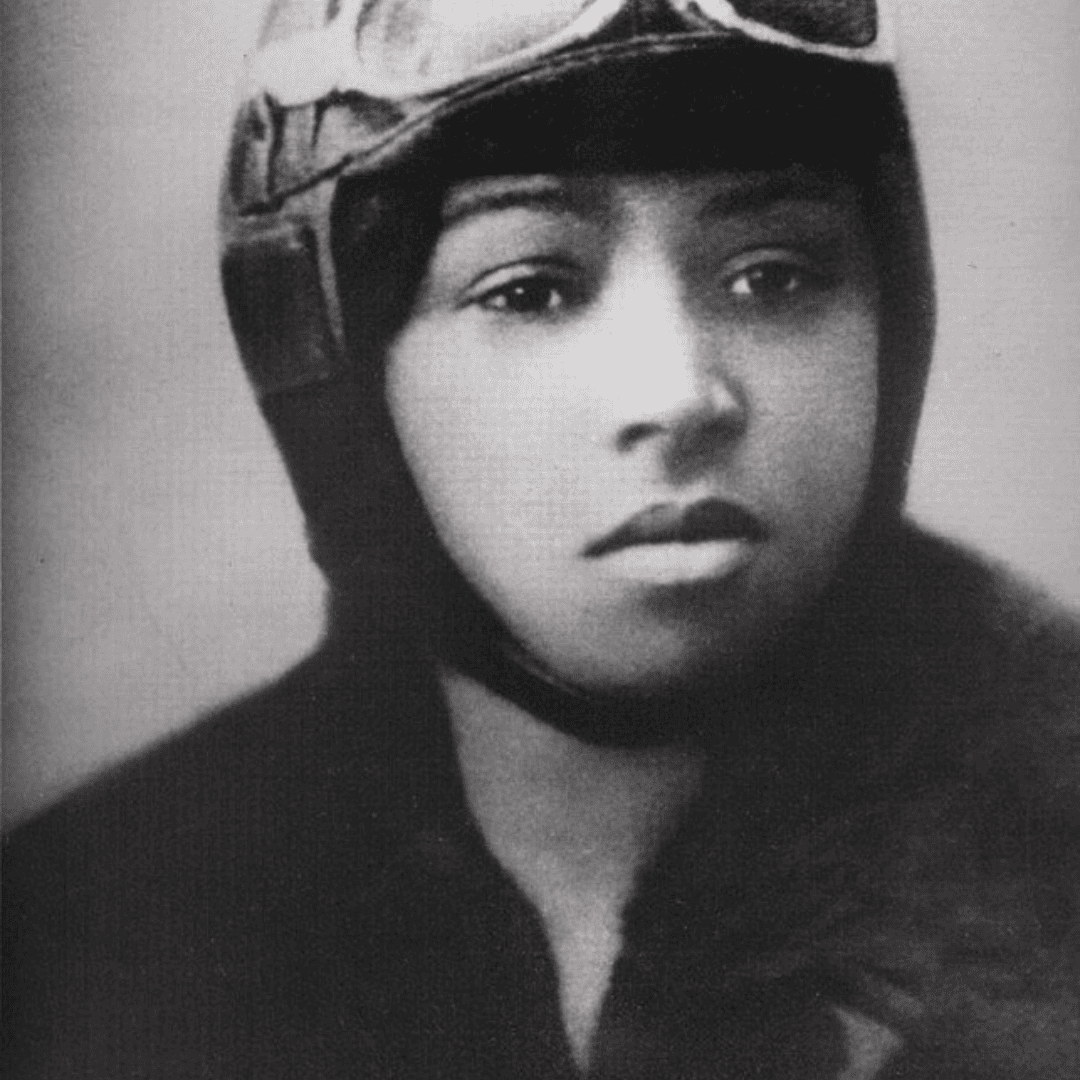-
How Sleep Deprivation Affects Black Women
Did you know that sleep deprivation costs the UK £40 billion a year? Without sleep, we don’t feel refreshed, we are more tired during the day, and we lack energy. This topic is important. Sleep deprivation affects many, and Black women need more awareness about it.
Sleeping is one of the best forms of self-care for our minds and bodies. Without enough sleep, our mental health suffers.
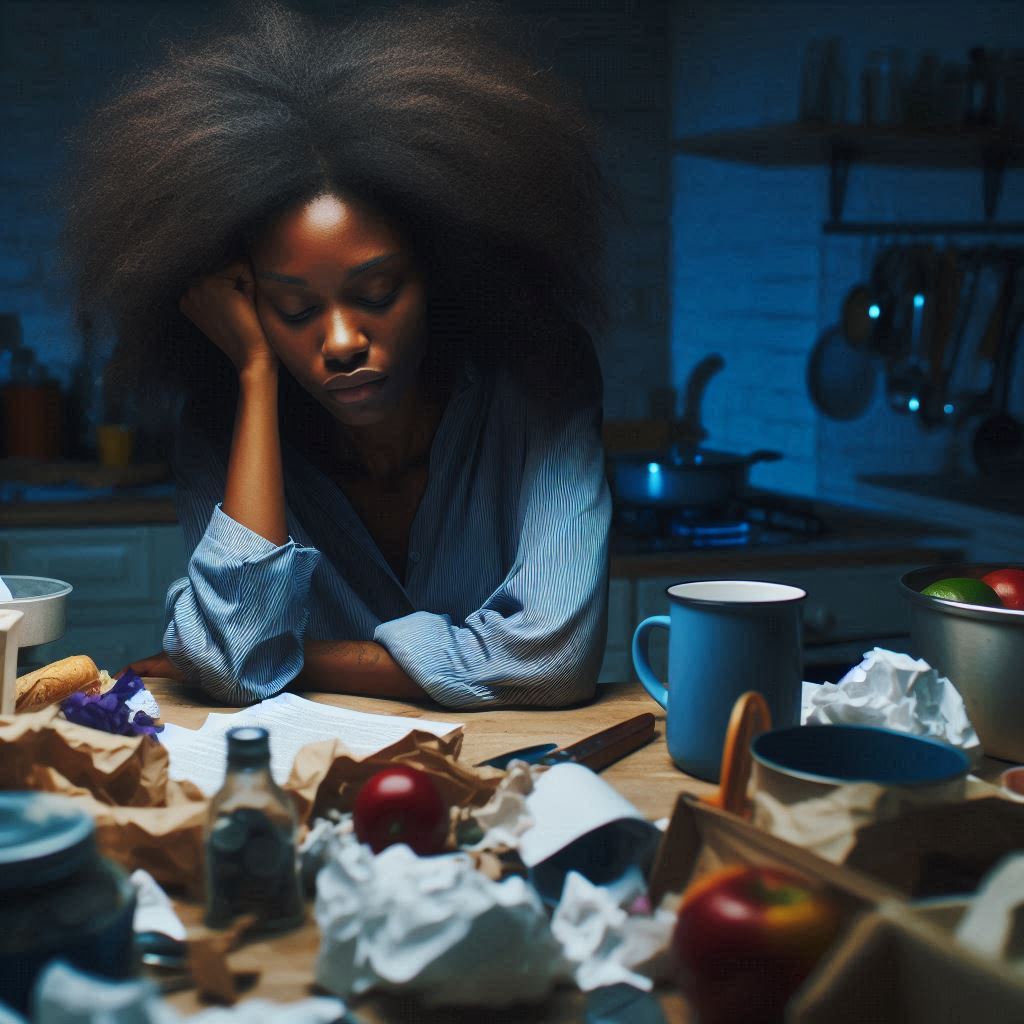
An AI image by DALL-E 3 of a black woman sitting in the kitchen, tired. What is sleep deprivation?
The NHS defines sleep deprivation as “when we are not getting enough sleep.” Mental Health UK recommends “that adults up to 64 should sleep 7 to 9 hours a day. This depends on their age, lifestyle, and health.”
Here are some signs of feeling sleep deprived:
- You find it difficult to fall asleep.
- You wake up several times during the night.
- You have difficulty focusing.
- You end up lying awake at night for a long time.
How detrimental is sleep deprivation in the UK?
A study from the Guardian revealed that people in poorer parts of Britain sleep less. They also have more trouble with sleep quality than those in wealthier areas.
The article says that Black people had the lowest sleep quality among all racial groups. You may have poor sleep quality if you wake up too early, wake up at night, sleep very little, or feel tired during the day.
Also, 24.7% sleep less than the required hours compared to 7.7% who sleep longer. On race, 82.4% of white people rose without difficulty in the morning. Seventy-four point four per cent of black people, seventy-four per cent of mixed-race people, and seventy-three per cent of Asian people followed this.
Black women face a hidden crisis of sleep deprivation. This issue needs greater awareness, as it continues to grow.
This is a big national concern. If the British government loses billions from sleep deprivation, it affects us all. We should all worry.
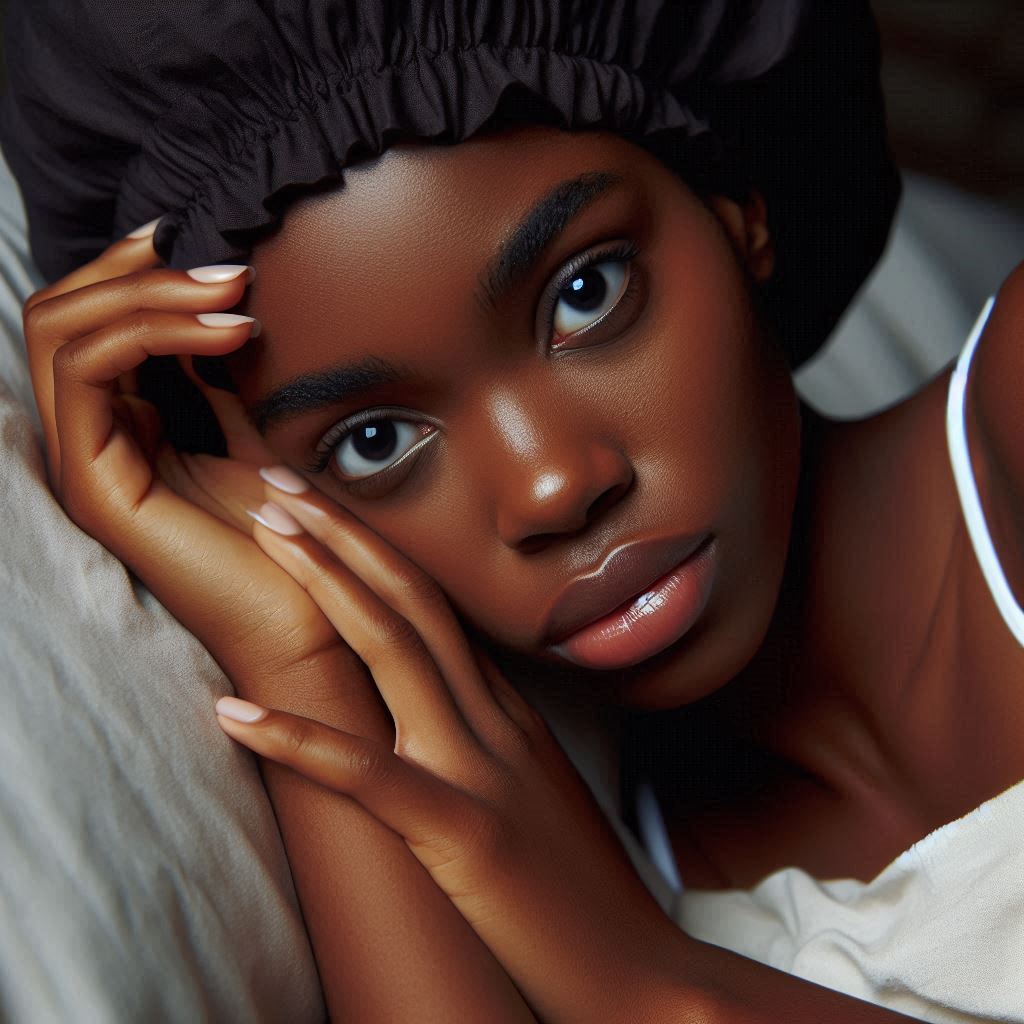
An AI image by DALL-E 3 of a black woman lying awake in bed with a bonnet. How does sleep deprivation affect Black women?
Sleep deprivation impacts black women for many reasons. We often bear heavy responsibilities. We should care for others. Yet, we often don’t get the support that other women get from the men in our communities.
Without protection, black women often face more intimidation, racial discrimination, and violence. This comes not only from black men but also from men of other racial groups.
An example is Diane Abbott, the first black woman politician to be a member of the Labour Party in England. Mrs Abbott is a respected politician, but she still faces racism and death threats.
There are mental and physical effects of dealing with sleep deprivation, such as:
- Feel more isolated
- Depression
- More likely to be affected by physical health problems.
- Feel irritable
- Poor focus, concentration, and memory.
How can racism and stereotypes have an impact on sleep quality?
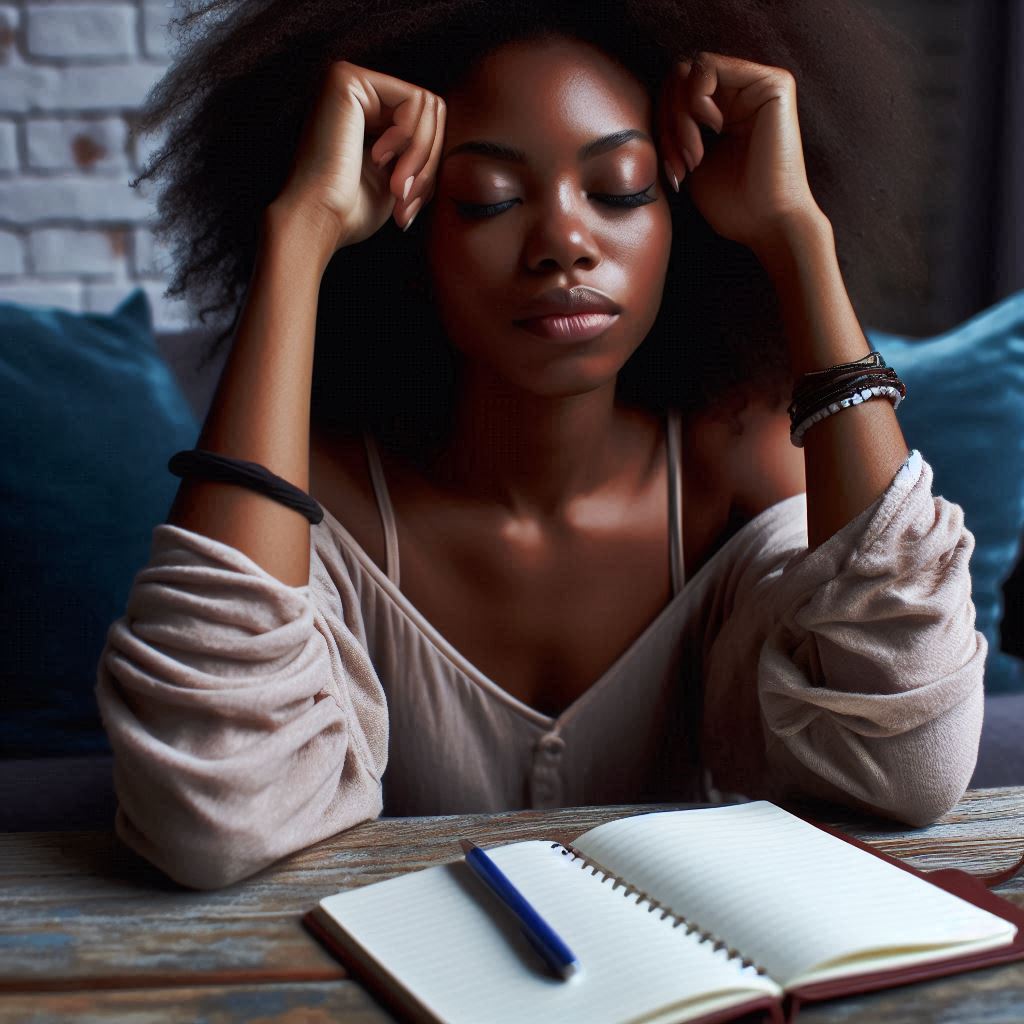
An Ai image by DALL-E 3 of a black woman looking tired whilst trying to journal. We also face ridiculous stereotypes about black women. These include the Jezebel, the angry black woman, and the strong black woman. There is also the false idea that black people are lazy, when anyone can be lazy.
This is harmful because it shows how far white people in power will go to create false images of black people. These stereotypes, like the idea that black people are lazy, still exist today, which is shocking to me.
History shows that slavery was a harsh system. It contributed to the wealth of many Western nations, including Britain.
If black women aren’t getting enough sleep, it affects their mental and physical health. The way we concentrate is getting worse because our brains are craving rest.
Getting less sleep makes you more likely to catch a cold. It also makes it harder to manage stress, which can increase anxiety. To make it worse, the lack of sleep can also affect memory.
Quartz pointed out that sleep deprivation can lead to poor mental health. This includes issues such as obesity, increased risk of blood pressure, diabetes, and depression.
Black British people often have poorer sleep quality. This lack of sleep can harm mental health, leading to stress, anxiety, and depression.
The Guardian noted that people with jobs tend to sleep better than those without. They also said that educated men who are single or live in shared houses in wealthy areas sleep better.
How does low income affect Black women with sleep deprivation?
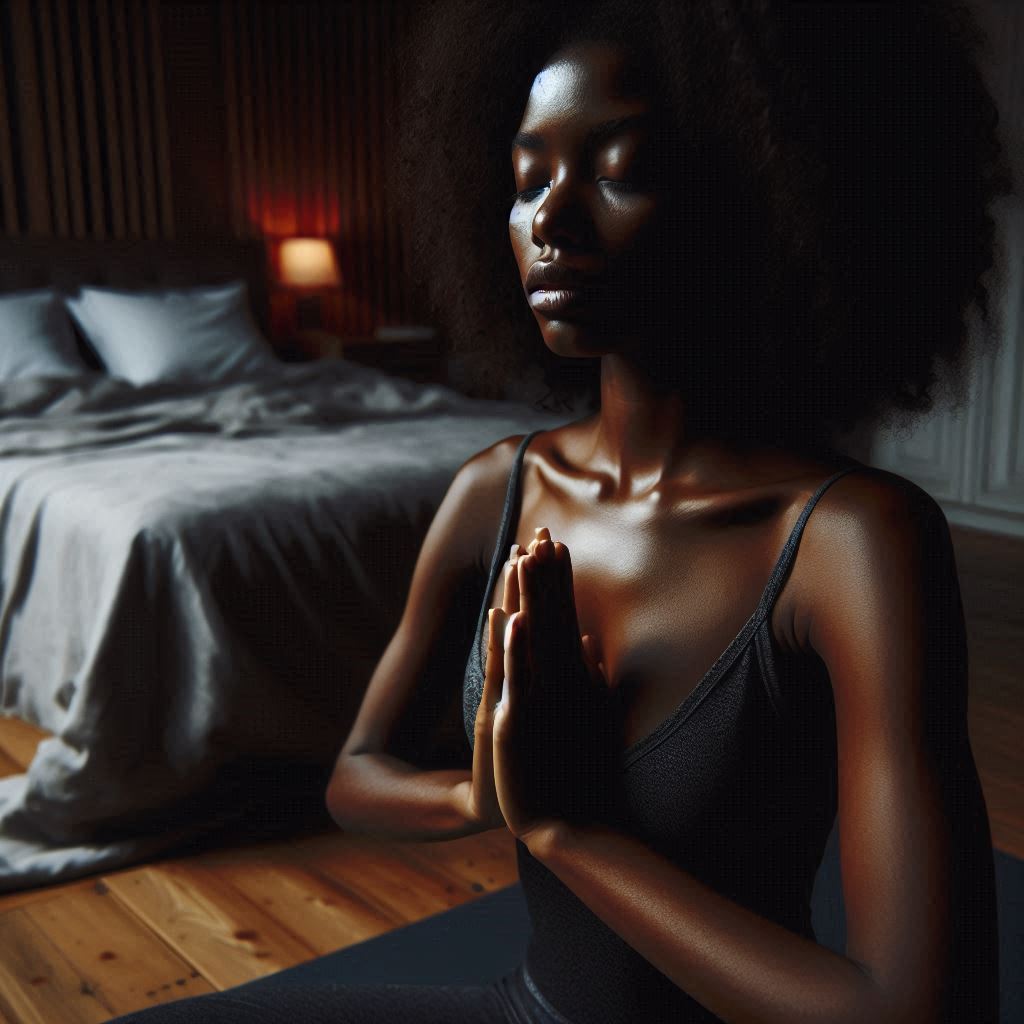
An AI image by DALL-E 3 of a black woman praying before sleep. Mental Health UK noted that worries about money, finances, life events, devices, and the environment can hurt sleep quality.
They noted that 1 in 5 people don’t get enough sleep. Also, 25% say finances affect their sleep. Women from BAME backgrounds are more likely to struggle with sleep deprivation.
If you are employed, then you will not worry as much about finances, and you are more likely to sleep better. If you’re unemployed, a lack of money may lead to stress, anxiety, and depression.
Imagine you are a black woman from a low-income home, and you are the main earner. Your sleep quality might suffer if you live in a deprived area. This can happen if you have a lot of responsibilities, like being a single mum or being in a relationship, and you are the main breadwinner.
This study didn’t mention black women living in wealthier areas. It only focused on educated men. Did they mean white men, mainly white men, or men from various ethnic backgrounds in those areas?
In addition, the study lacks details on black women in wealthy areas. It doesn’t say if they sleep better or worse than educated men, or if they live in shared housing.
Are middle-class black women more likely to experience sleep deprivation? This could be due to their work in corporate environments. Black women have to work twice as hard and face microaggressions.
Also, the study was created focusing on people aged 40 to 69, so it doesn’t take into account other generations, such as younger millennials who are between 29 and 40.
Black Women and the Power of Rest
There are organisations led by black people that consider the need for rest and sleep. These organisations in the USA know that sleep deprivation impacts the black community.
The Nap Ministry is an organisation founded in 2016 by Tricia Hersey. She is an author who shows how racism affects the rest of the Black community.
They offer resources and support for community healing. They also highlight how important rest and sleep are.
Another initiative, called Black Power Naps, teaches Black communities why rest matters. Vogue says Fannie Sosa and Navild Acosta started this initiative, and they believe society has never valued rest for black people.
They talked about how slavery in the USA took away time and rest from black people. This caused a sleep crisis. The Black Power Naps are rising to the challenge. They are using installations, zines, opera, and more. They call for more rest as reparations and a time and place to dream and sleep.
Final Thoughts
This was an interesting topic that was inspired by an Instagram post I saw created by The Noire Space. They talked about the importance of sleep, and I got an idea of writing about sleep deprivation affecting black women.
This has been a personal experience, and I wanted to write about this topic because it’s not discussed. Where do black British women go to talk about sleep deprivation other than the GP? There are not many sleep wellness organisations catering to rest and sleep for black British women in the UK.
Thank you for reading! If this article inspired you, don’t forget to comment below. It helps me create more content uplifting Black women. We often hear that history repeats itself, but what if we could rewrite the narrative? What if we could make sure Black women’s contributions to certain musical genres were no longer ignored? That’s what I’ll be exploring next.
-
A New Era: Reshaping The Representation Of Black Women In The Digital Space And Disrupting Stereotypes
We know that the power of media can influence the way we perceive people. We are aware of how stereotypes of black women can perpetuate the negative representation of black women globally.
This can affect black women negatively and this is represented in many ways that degrade black womanhood such as hip-hop videos where black women are used as objects and the term “baby mama” which places a negative stigma on black motherhood.
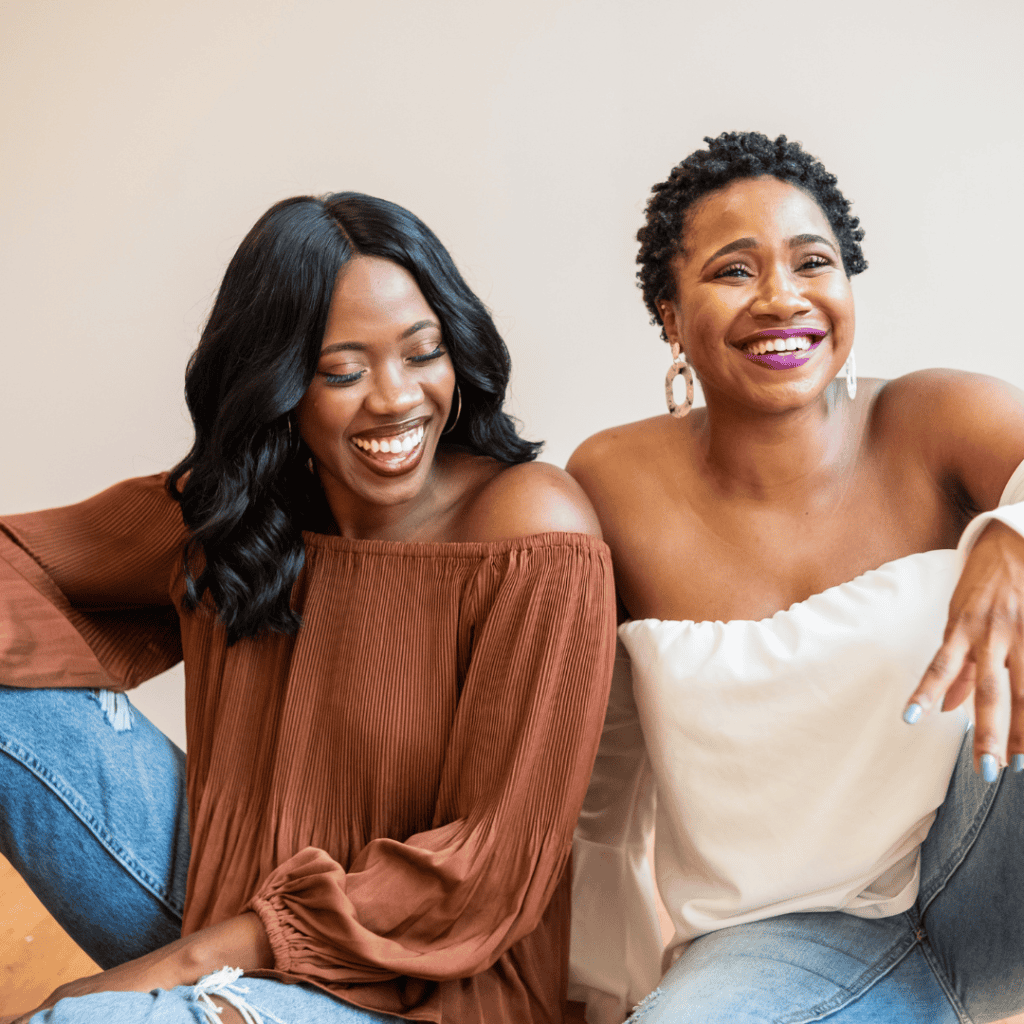
2 black women sitting on the floor with one arm on the knee, posing and smiling. Photo by Alex Starnes from Pexels on Canva. 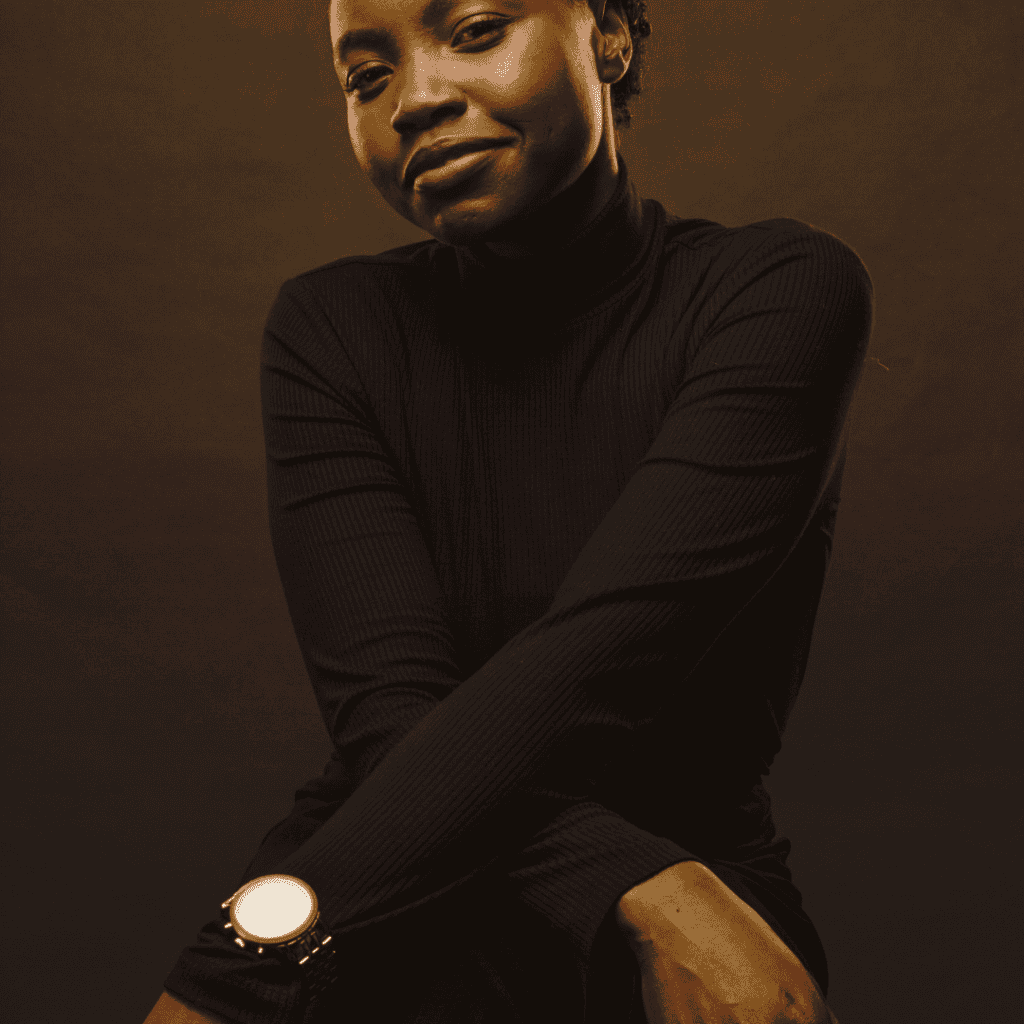
Photo of a black woman with a long long-sleeved shirt by Dellon Thomas on Pexels. This is why this topic is important because positive representation of black women is crucial for self-confidence, higher self-esteem and self-worth which we know is crucial for believing in yourself.
Post-Brexit has amplified how other people’s experiences and opinions about topics such as immigration contributed to the UK leaving the European Union in 2016. Covid-19 affected the mental health of black communities and increased the existing health inequalities since black communities were more affected due to lockdown.
In terms of documenting the experiences of black women, there haven’t been many reports that have spoken about black women’s experiences in the UK. A report by Springer published by Francesca Sobande talks about a report written in 1995 by the European Women’s Lobby that was based on women from different ethnic backgrounds. There isn’t a lot of information about this report so it is unknown how much progress was made from this study.
This is important because social media, blogs and search engines have created spaces for black women to discuss diverse topics that can help build online communities and connect with other black women from different cultures, ethnic groups, languages and occupational backgrounds.
This relates to the stereotypes because digital experiences have enabled many black women to change the way the mainstream media have portrayed black women through the power of storytelling.
The Black Cultural Archive is the only organisation in the UK that archives and preserves the black experiences of people of African and Caribbean descent.
Black Feminist Organisation and Experiences
There has been a history of black feminist organisations that have provided spaces for black women to meet and discuss the issues that relate to black women in the UK during the 1970s and 1980s.

They focused on several political, social and cultural issues ranging from reproductive health, immigration, culture, housing and health. These topics were discussed using their newsletter Speak Out.
There have been events that have focused on black women such as International Women’s Week at the black art gallery in 1986, and the Black Women and Media Conference in the factory in West London in 1984 provided spaces for black women to amplify their voices.
Also, the National Black Women’s Conference hosted by the Organisation of Women of African and Asian Descent in 1980.
The Brixton Black Women’s Group were instrumental in making sure that black women’s voices were heard and felt supported and they provided a place for other black women to meet, network and discuss in a safe space.
Stereotypes And The Representation of Black Women in the USA
The exploitation of the black woman’s image has been known and documented, it has been a profitable yet negative way of stereotyping black women that has controlled the way some people perceive black women. There are 4 black stereotypes that have been dominating the film industry for a long time and black culture. These are baby mama image, Mammy, Sapphire and Jezebel.
Mammy– The Enslaved Negative Stereotype
The Mammy character is rooted in racism and colourism and this is a character that was designed to be degraded by the white audiences. According to the author and professor Marquita M. Gammage of the book Representation of Black Women in the Media, she explained that these images were designed to ridicule black women to justify the mistreatment, racial discrimination and physical and sexual assault of black women.
According to the BBC, this stereotype originated in the USA and was influenced by transatlantic slavery in the USA. Historians have stated that 90% of enslaved black women during slavery at the time died young and this implies that the idea of Mammy is fictional.
Mammy is described as an overweight, dark-skinned black woman, a myth created to romanticise the idea of slavery, she worked in the white slaveowner’s house was loyal to the white family and prioritised her needs towards the children of the slaveowners more than her own family.
In her book, Professor Gammage explained that this myth was created to maintain the racist system because slavery was a legal, economic system that produced wealth for the white slaveowners.
Racist films such as Gone With The Wind have contributed to the development of black characters that ridicule black people. In the film, the Oscar-winning actress Hattie McDaniel plays a maid who isn’t seen as feminine or attractive. She was operating from her masculine energy based on the environment that was designed to abuse her. One thing to note is that she was in her superwoman image of doing everything.
This film revealed many concepts such as beauty and femininity, because in the West whiteness is the standard of beauty and anything that is not white is the opposite. This is why Hattie McDaniel and the other black actresses were not perceived with femininity, honour and grace in the film. These roles were not created for positive representation of black women but rather harmful to black womanhood.
The Jezebel Stereotype
Another famous stereotype used to devalue black womanhood is the Jezebel image. This image was created as a sexually liberated black woman who could potentially lure white men to bed.
She was perceived as a younger or middle-aged woman who was hypersexual and couldn’t control her sexual desires. According to the Open Edition journal, Jezebel was a promiscuous woman and as a result, this justified the white slaveowners to sexually abuse enslaved black women based on a myth.
An example that was used in Professor Gammage’s book was Olivia Pope from Scandal. Even though Ms Pope is smart and driven, the idea that she could be seen as Jezebel was the fact that she had an affair with the President and this may look like she lured the President when in reality they made their own decisions to have a secret affair.
The Sapphire Stereotype
This stereotype is based on the idea of the so-called angry black woman, this was an attempt to control how black women are supposed to feel when we know the importance of expressing our emotions. When black women are not allowed to process our emotions we are given the label-angry black woman.
In comparison, the benefits of white privilege allow white women to process their emotions means that the whole group of white women isn’t judged and because white men have uplifted white women as the standard of beauty where whiteness is valued globally, white womanhood isn’t judged, and white women are welcomed with empathy when they are angry.
An article by the BBC portrayed Serena Williams as the “angry black woman” when she was given a penalty for breaking her racquet, another penalty for calling the umpire “a thief” and a code violation for coaching during the US Open final in 2018 against the mixed-race tennis player Naomi Osaka. This included getting fined £13,000($17,000).
In comparison, in the film Home Alone, there is a scene where the mum is at the airport feeling angry because she left her son home alone while she was talking to the staff at the airport.
If you watch the scene you can tell she’s upset but if she was a black woman who left her son home alone- most likely she would have been labelled crazy and would have been stigmatised as a black mother.
In this case, she would have been emasculating her husband, lacked maternal instinct and did not care about her responsibilities as a mother.
This is how deep the racist stereotype of black women has influenced the perception of black women which is why it is important to point out the hypocrisy because we forget how deep the racial stereotyping has even influenced how black mothers are treated in the black community.
The Baby Mama Stereotype
According to the 34st the term “baby mama” is an African-American slang given to black women who are mothers. Baby Mama is being used to portray black women as a problem because it shows much respect and values black men place on black women. Both parents have responsibility for raising their child however, in the black community, the mother tends to be ostracised more compared to black men who are absentee fathers.
An example is Russell Wilson who raises her son that she had with rapper Future who is uplifted by black men despite having children with different women and not taking accountability for being more involved with his children.
This is something you hear on social media about many black men who don’t feel the need to raise their children and provide financial support which sends the wrong message to the younger generation and this is something that needs to be discussed especially in the UK.
A single parent shouldn’t be blamed for raising her child when the father decides not to be in the picture. She is already in her masculine and feminine energy to nurture and provide and this explains why black women have to be strong to cope because it can lead to health issues.
The Positive Representation of Black Women
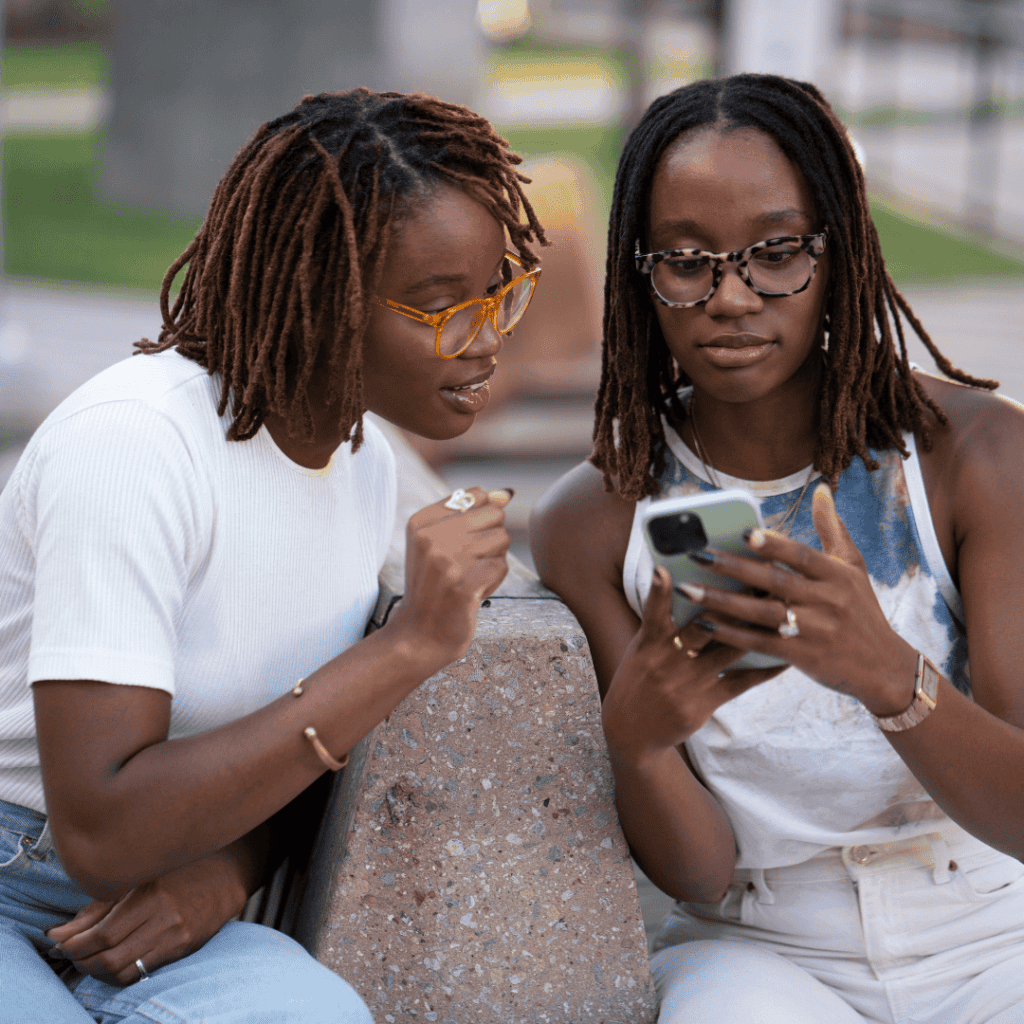
2 black twins with locs looking at their smartphone. Photo by THE PALMER on Canva The blogosphere and social media have provided great opportunities for black women to talk about their experiences. It has allowed black women to amplify their voices online and enable black women to connect with other like-minded black women.
Digital content reflects the authentic voices of black women globally instead of relying on the mainstream media to tell our stories, this opens up more opportunities for black women to take control of their narrative.
It disrupts the stereotype that the mainstream media has been using to portray black womanhood. Search engines such as YouTube have provided many opportunities for black content creators because black women can search and build communities in places that aren’t as diverse such as gaming, anime or beauty.
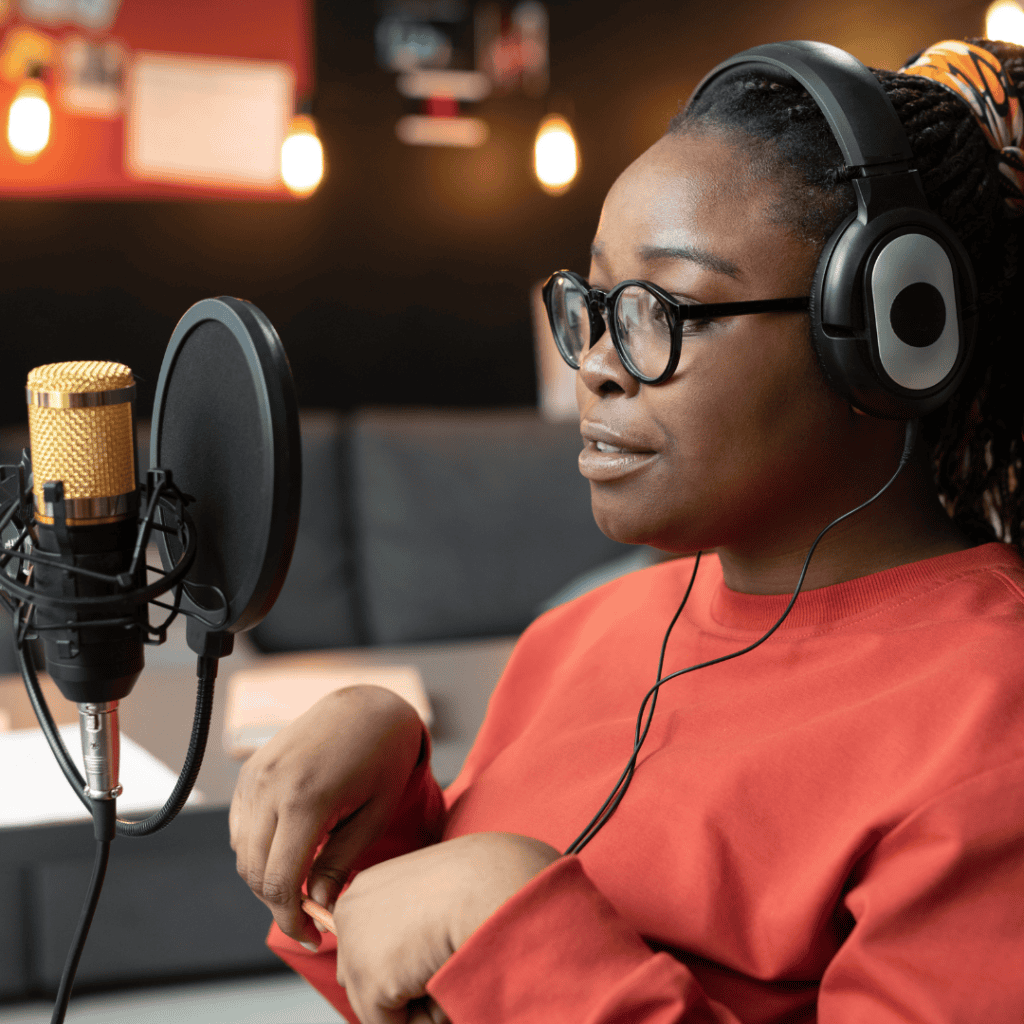
A woman recording her podcast. Photo by Anna stills These publications are some of the independent online magazines that cater to the experiences of black women. They are:
There are more recent TV series that focus on black women’s stories and experiences such as Insecure, Awkward Black Girl, How To Get Away With Murder, Scandal and Queen Sugar which features a dark-skinned actress called Rutina Wesley as Nova Bordelon as one of the main characters who is a bisexual, free-spirited and spiritual woman.
Recently, Channel 4 aired the show ‘Queenie’ based on the book of the same name by the author Candice McCarty-Williams. The book is great, frustrating and enjoyable(I would recommend reading it if you haven’t read it yet).
Conclusion
This post explores the representation of black women looking at digital experiences in the UK and negative stereotypes and the USA. The representation of black women can progress when we focus on telling our stories.
Yes, it’s important to see yourself positively on TV, however, there is a need for black women to continue telling the narratives are authentic and beneficial for better representation.
This is why platforms such as Black Ballad and Black Girl Fest are as important as TV shows such as Insecure because the show was created by black actress and entrepreneur Issa Rae.
It was joyful to see the representation of black millennial women living life dealing with adulting, relationships, ghosting and family in a way that shows the range of emotions and without the need to ridicule black women.
Also, black women have a huge spending power and this means that we can invest in diverse stories and feature black women as multifaceted with various interests, doing activities that you don’t see day to day and the stories are compelling even if they involve suffering, it’s written from black women’s perspective.
Thank you for reading this blog post, I hope you enjoyed this topic and if it was interesting to you, let me know what you thought about it in the comments and let’s start a conversation. I will be writing more about this topic because documenting our experiences as black women is crucial.
eBook: Representation of Black Women in the Media: The Damnation of Black Womanhood by Marquita Marie Gammage.
-
Tina Bell: The Overlooked And Forgotten Pioneer of Grunge
Disclaimer: This article is written for educational purposes to the best of my knowledge and may contain errors and omissions. I am not a qualified historian or a teacher and this blog may change focus at any time please read this at your own risk.
Introduction
When you think of grunge music, who do you think of? White men in a band such as Nirvana. Even though there are black people in famous indie rock bands such as Skunk Anansi or Bloc Party, grunge tends to be associated with predominantly white men. It ignores other bands that don’t fit into the white male image of rock music.
Who are the Bam Bam?
Did you know that a black woman called Tina Bell was in a rock band called Bam Bam who helped create the subgenre known as grunge by combining punk and heavy metal?
Bam Bam was a grunge rock band that was created in 1983 in Seattle, USA. The band included Tina Bell, the lead singer and songwriter, her husband and guitarist Tommy Martin, the drummer Matt Cameron and the bass guitarist Scotty Ledgerwood.
Cameron left the group in 1984 and formed other bands such as Soundgarden and Pearl Jam and Tom Hendrickson replaced him. Ms Bell was known for her powerful vocals and stage presence that captivated the audience.
Who is Tina Bell?
Tina Bell was born on the 5th February 1957 in Seattle and she was the oldest daughter of 10 children and sang in the Mount Zion Baptist church as a child. She attended Washington State University, studied drama, and then joined the Langston Hughes Performing Arts Institute.
As a student, she was preparing to sing the French rendition of the song C’est Si Bon and needed a French tutor to help with the lyrics. She called Tommy Martin from an advert in the newspaper and Mr Martin and Ms Bell fell in love, they got married and had a son called TJ.
Bam Bam had loyal fans in Seattle and released 1 EP called Villains (Also Wear White), 2 singles called Ground Zero and Show What You Know and 2 albums called Free Fall from Space, and Bam Bam House Demo. They performed at packed gigs and live shows, and they were voted twice for the best Seattle bands and performed at the Metropolis.
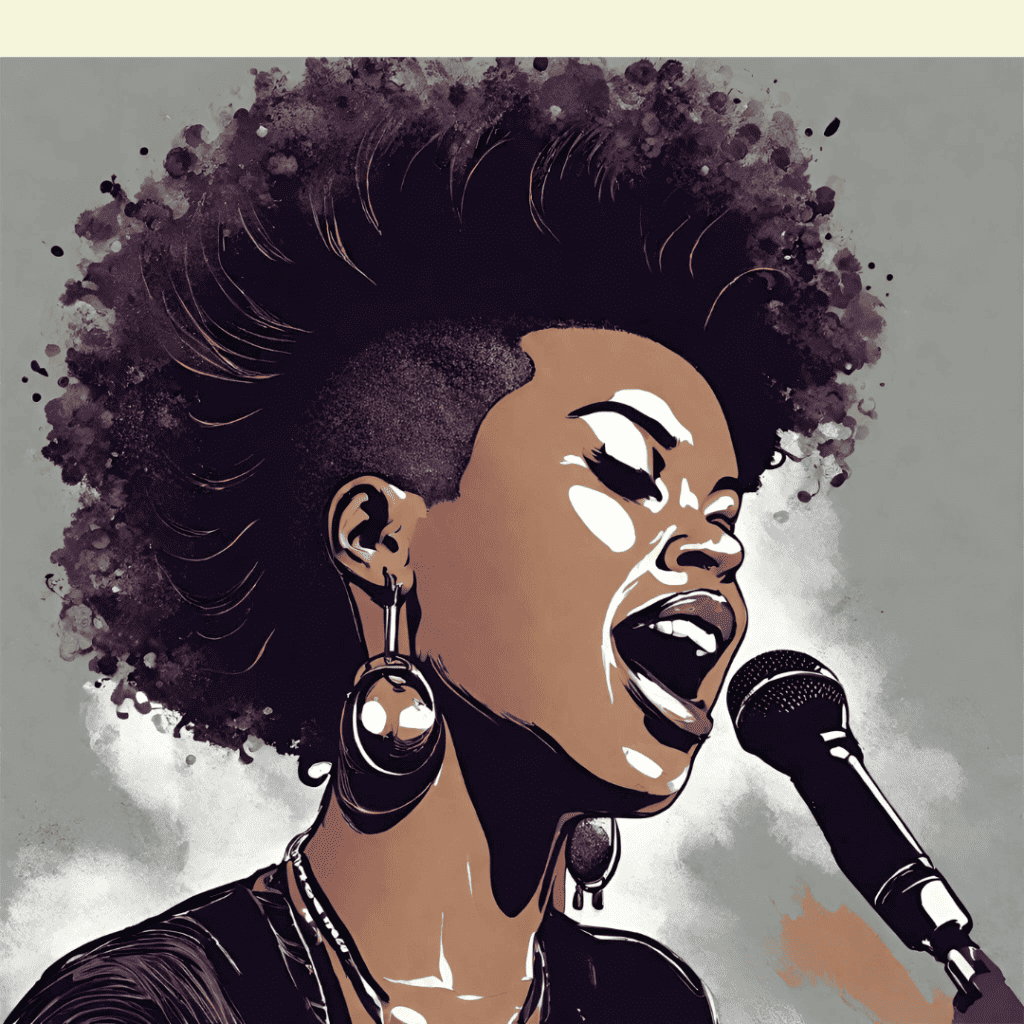
An AI illustration of a black woman with a mohawk using Canva by Afro Lit Stories. What happened to Tina Bell?
According to the Culture Rock Griot interview, Ledgerwood explained that Bam Bam didn’t get the recognition they deserved because of the racism and sexism that contributed to the band being erased from grunge history.
Ledgerwood continued revealing how black women are meant to be portrayed as the “hip-hop, R&B or a soul diva” Since she was the lead singer of a rock band, it didn’t fit into the idea of what a rock band should represent at the time.
In the 1980s, Bam Bam moved to Europe with the aim that living in Europe would give them more opportunities for the band. However, things didn’t go as planned because by the time they left the USA, grunge had already reached the mainstream audience, and living in Europe didn’t advance their careers.
As the writer Jen B. Larson wrote in the article by The Stranger she explains that “audiences were not ready to see an African-American in a rock band.”
The lack of acknowledgement affected the band especially Ms Bell since she helped grunge thrive and erasure is nothing new to black artists who have created and innovated music, only to be forgotten. They returned to the US and Ms Bell left the band in 1990. She divorced Mr Martin in 1996, became depressed and turned to spirituality, religion and astrology.
How did she die?
Ms Bell died on the 10th October 2012 due to cirrhosis and struggled with depression and alcoholism. According to her son TJ Martin, Ms Bell was dead for a couple of weeks and her belongings were thrown out without notifying her family.
Final Thoughts
I hope you enjoyed reading this short blog post. I can imagine how she must have felt leaving the band, knowing how exhausted and frustrated she must have felt not receiving her recognition. The fact that I heard about her a couple of years ago shows that Ms Bell was forgotten and overlooked.
Don’t forget to share this blog post with other black women interested in knowing more about black women’s experiences and stories in society. And let me know what you think about this blog post in the comments.
-
3 Overlooked Black Women of the British Black Panthers
Disclaimer: This blog contains content that is written about British black Panthers for educational purposes. The information provided is accurate to the best of my knowledge and there may be omissions and errors. I am not a qualified teacher or historian and should not be seen as educational advice. I reserve the right to run and manage my blog and the focus of this blog may change at any time.
These 3 influential black women are known for their community activism, organising and championing black people’s rights especially black women’s rights.

An illustration of 2 black women posing by the bookshelf. Illustration from AI on Canva. Who is Altheia Jones-LeCointe?
A physician and a research scientist from Trinidad and Tobago, she was considered the leader of the British black Panthers, her experience in politics started when she was younger. Her parents were active in politics and were part of the People’s National Movement.
She moved to Britain to study chemistry at University College London and was shocked about the hostile treatment and racism she received as a black woman in the 1960s and sought groups to join that reflected her experiences.
When the British black Panthers came to support black students at the university, that is when she became more politically active in the university and joined the British Black Panthers.
During the Mangrove Nine trial, she represented and defended herself in the court system and this led to the Mangrove Nine trial being acquitted after a long trial that lasted 55 days.
She became one of the renowned activists in the British black Power movement during the 1960s and 1970s.
Who was the Brixton Black Women’s Group?
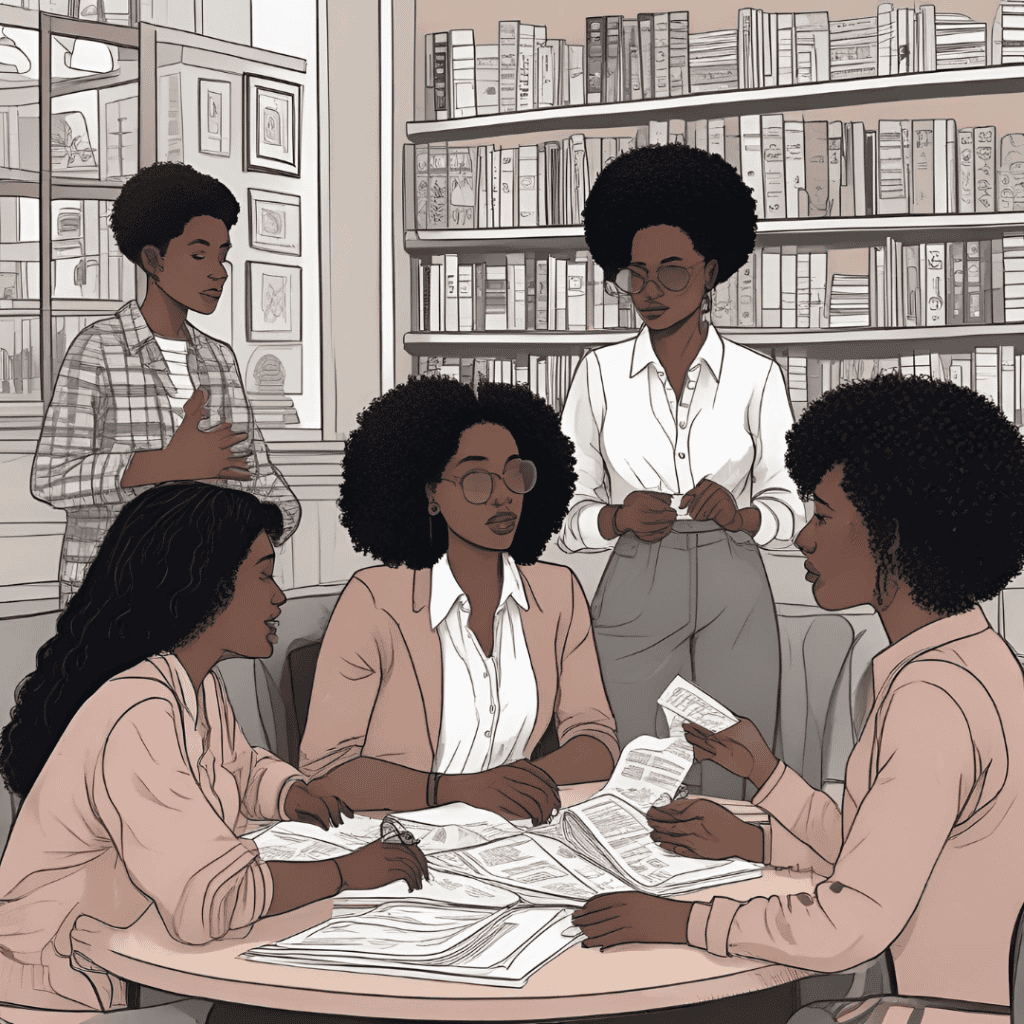
Illustration of black women at a meeting in a bookshop created using AI on Canva. After the British Black Panthers split as an organisation, Beverley Bryan, Olive Morris and Liz Obi left to create their organisation called Brixton Black Women’s Group.
This was established as a result of sexism and a lack of interest in empowering black women. They created a safe space which was necessary to focus on addressing issues concerning black women.
How did they help black women?
The organisation offered advice and support to black women in the local community, similar to the British black Panthers but this time, they were more focused on the experiences of black women.
Who is Olive Morris?
Olive Morris was an influential community activist, feminist and leader, who became active in politics when she witnessed a Nigerian diplomat being assaulted by police officers because he had a Mercedes. When she rushed to help him, she ended up being assaulted by policemen and fined.
She defended the rights of black people who squatted in empty buildings. Squatting was a common practice that happened as a result of racist housing practices. This meant that some black families were put in poor accommodation that wasn’t fit for the standard of living.
What happened after she left the British black panthers?
After she left the Panthers, she focused on building the Brixton Black Women’s Group and moved to Manchester and studied Economics and Social science degree at the University of Manchester.
While she was studying she created the Manchester Black Women’s Cooperative. She travelled globally, writing and lecturing on topics based on women’s and black empowerment and racism.
How did she pass away?
In her final years, she collaborated with another activist and writer Stella Dadzie and created OWAAD(Organisation of Women of African and Asian Descent). While she was in Spain she started to feel ill and she discovered that she developed blood cancer. Olive Morris passed away on the 12th July 1979. from a form of cancer aged 27.
Who is Beverley Bryan?
A retired professor, writer, activist and teacher, Bryan moved from Jamaica to England and attended the same school as the late activist, close friend and founder Olive Morris.
In her youth, she joined the West Indian Centre and then joined a black arts workshop and travelled to different youth clubs across the country. They used poetry and spoken word to challenge negative racial stereotypes.
After completing her teaching training at Keele University, she moved to Brixton and joined the British Black Panthers. She used education to solve issues in the black community helped educate children at the supplementary schools and taught Maths, English and History.
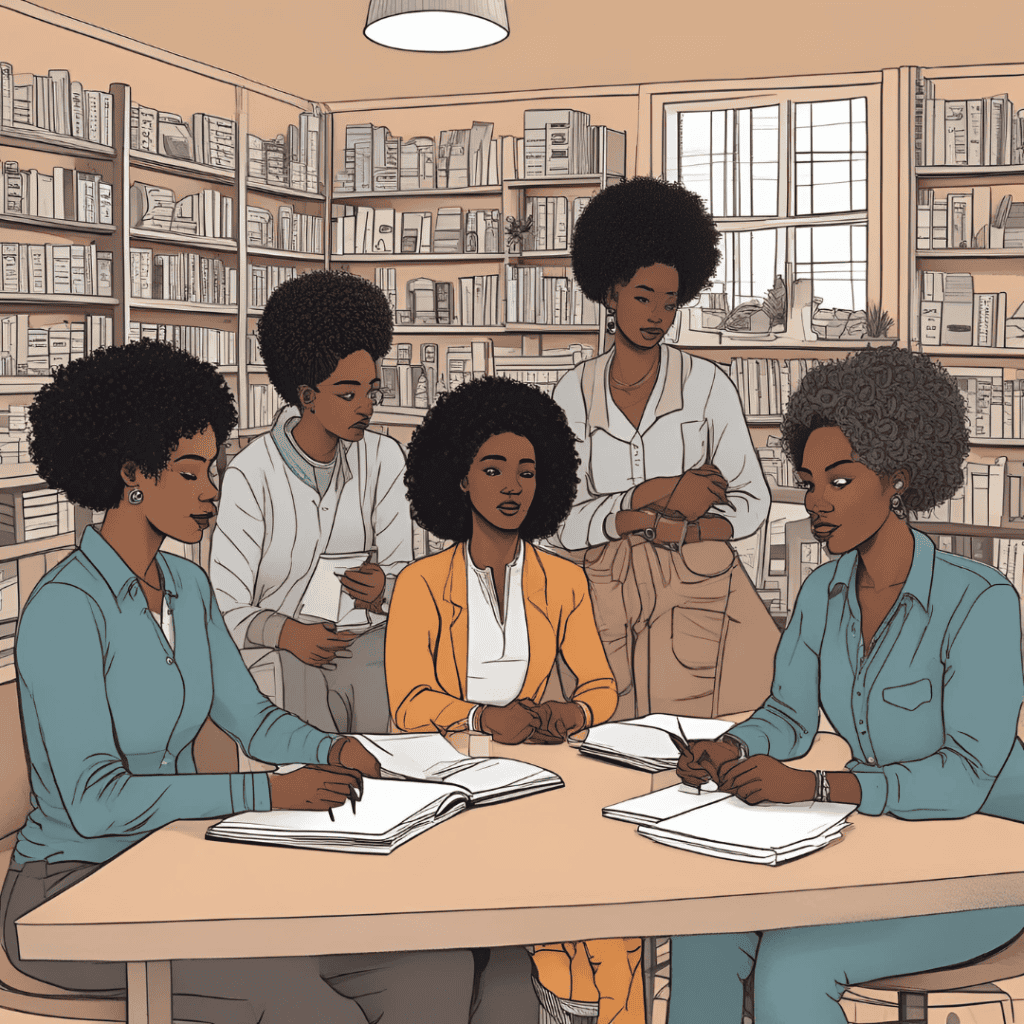
An illustration created by AI by Afro Lit Stories on Canva. Final Thoughts
I hope you enjoyed reading the article about the 3 powerful women and how influential they are in the black community as educators, activists and community organisers who were determined to make changes in the black community using education and knowledge of self.
If you are intrigued by black British history and want to know more about black women’s contribution then share this article with another black woman who enjoys reading this topic. And don’t forget to leave a comment and let me hear your thoughts below.
Related Articles
-
No Longer Forgotten: The British Black Panthers Story
Disclaimer: This article is written for educational purposes about British black Panthers and may include the opinions of the writer. It is accurate to the best of my knowledge but there may be omissions in this blog post. I reserve the right to change how I run and manage my blog and may change focus at any time.

A group of black people protested in the streets. Illustration from Canva. A Brief Historical Background
Before the Windrush generation arrived in June 1948, black communities were dealing with racial discrimination and racism(even though we are still dealing with racism) from members of the white society.
In 1919, there were many attacks against black people that took place in London, Manchester, Hull and South Shields.
Before the racial discrimination law was passed in 1965, there was a legal yet racist practice called the colour bar which made it extremely difficult for black people to seek and apply for jobs and accommodation.
Who were the British Black Panthers?
A Nigerian playwright called Obi Egbuna created the British black Panthers in Notting Hill, West London in 1968. Influenced by the activists of the Black Panther Party in the USA, they adopted military jackets and black power fists without using any weapons.
The aim was to address police brutality and included the idea of political blackness. The British black panthers adopted the concept of political blackness because all non-white people are affected by racism, and they decided that it would be more suitable to refer to everyone as black in the organisation.
Another key difference is that there were Asian activists involved with the British black Panthers from the beginning such as writers and activists Farrukh Dhondy and Mala Sen. Unfortunately, the presence of the founder was cut short when he was arrested for allegedly threatening the police.
Who were the members of the organisation?
The organisation grew to 3,000 people but the main activists in the organisation were Altheia Jones-LeCointe, a Trinidadian PhD student who was considered the leader of the organisation, and Eddie LeCointe, an activist and later Altheia Jones’ husband.
And the late Olive Morris, an influential community activist and leader who joined the organisation when she was younger and defended squatter’s rights.
Other renowned members included Liz Obi, an activist and feminist who was a close friend of Olive Morris. Beverley Bryan, a retired lecturer, activist and writer who used to teach children at the Saturday schools and Darcus Howe, the late Trinidadian writer and activist who was involved in the Black Power movement abroad and in the UK.
Barbara Beese, an activist who was involved in the protest and in the Mangrove Nine Trial and Neil Kenlock, a photographer who captured the important events.

An illustration of black people protesting on the streets. Illustration by Canva. What was the Mangrove Nine trial?
The Mangrove Nine was a restaurant that was established by Frank Crichlow in 1968 in Notting Hill, a Caribbean restaurant that became a haven for the black community. The restaurant attracted famous people such as the late Jimi Hendrix, Nina Simone, and Diana Ross.
However, the restaurant was known to receive harassment from the police because they thought that a successful black-owned business must have been funded by criminal activities.
Mr Crichlow sought help from the British black Panthers and on the 9th August 1970, they led a protest with 150 people which turned violent and resulted in a trial. The trial lasted for 55 days and was successful because it exposed the racism in the police force.
It was nine activists that were arrested including Altheia Jones-LeCointe, Darcus Howe, Frank Critchlow, Godfrey Millet, Rothwell Kentish, Rhodan Gordon, Barbara Beese, Rupert Boyce and Anthony Innis.
What did the British black panthers achieve?
They achieved many things such as creating supplementary schools also known as Saturday Schools and creating their newspaper called Freedom News. These schools were instrumental in making sure that black children were taught their history and instilled a sense of black pride and self-confidence.
They had branches throughout England that were located in cities such as Manchester, Bristol and Nottingham. They established the Black Power Youth League which Olive Morris and Linton Kwesi Johnson were members of when they joined the organisation.
Why did the organisation end?
The British black Panthers split in 1973 and the members decided to embark on other projects. Each activist contributed their skills and experience which made the British black Panthers successful and necessary in the black community.
According to an article by Refinery29, Altheia Jones-LeCointe mentioned that she made sure that women had their voices heard in the organisation that there were discussions based on gender roles and that there was a need for a group dedicated to black women.
The split of the organisation included sexism which the women experienced and led Olive Morris, Liz Obi and Beverly Bryan to start the Brixton Black Women’s group.
Focus on Black Male Leadership
One thing that needs to be discussed more openly is the focus on black men during the civil rights and black power movements. This is an important conversation to have because we know that black women have contributed a lot to these movements and they are not always recognised.
Black women have contributed to different black power movements and have been involved in progressing the black community and there isn’t enough recognition to acknowledge the black women activists and educators.
On the other hand, when we do learn about the black power movement in the USA, the recognition isn’t given to black women compared to black men.
The issue with Political blackness
It’s problematic to refer to everyone as black when they were not born as a black person. Yes, Asian people also suffer from racism, however the idea of referring to them as black isn’t helpful. It’s like giving away your race to people who are not black and psychologically it doesn’t make any sense.
Final Thoughts
I hope you enjoy reading about the British black panthers as much as I enjoyed researching them. It’s a shame that you don’t hear about them during school or in college.
Don’t forget to share this post and comment below about your thoughts regarding the British Black Panthers, political blackness, the focus on the men and not enough focus on black women in these black power movements and sexism.
Related Articles
-
The Life and Legacy of Bessie Coleman
Disclaimer: This article is based on Bessie Coleman for educational purposes. The information about this topic is true and accurate to the best of my knowledge, but there may be omissions. I am not a qualified historian or teacher and should remind readers to read at their own risk. I reserve the right to change how I run and manage this blog and may change focus at any time.
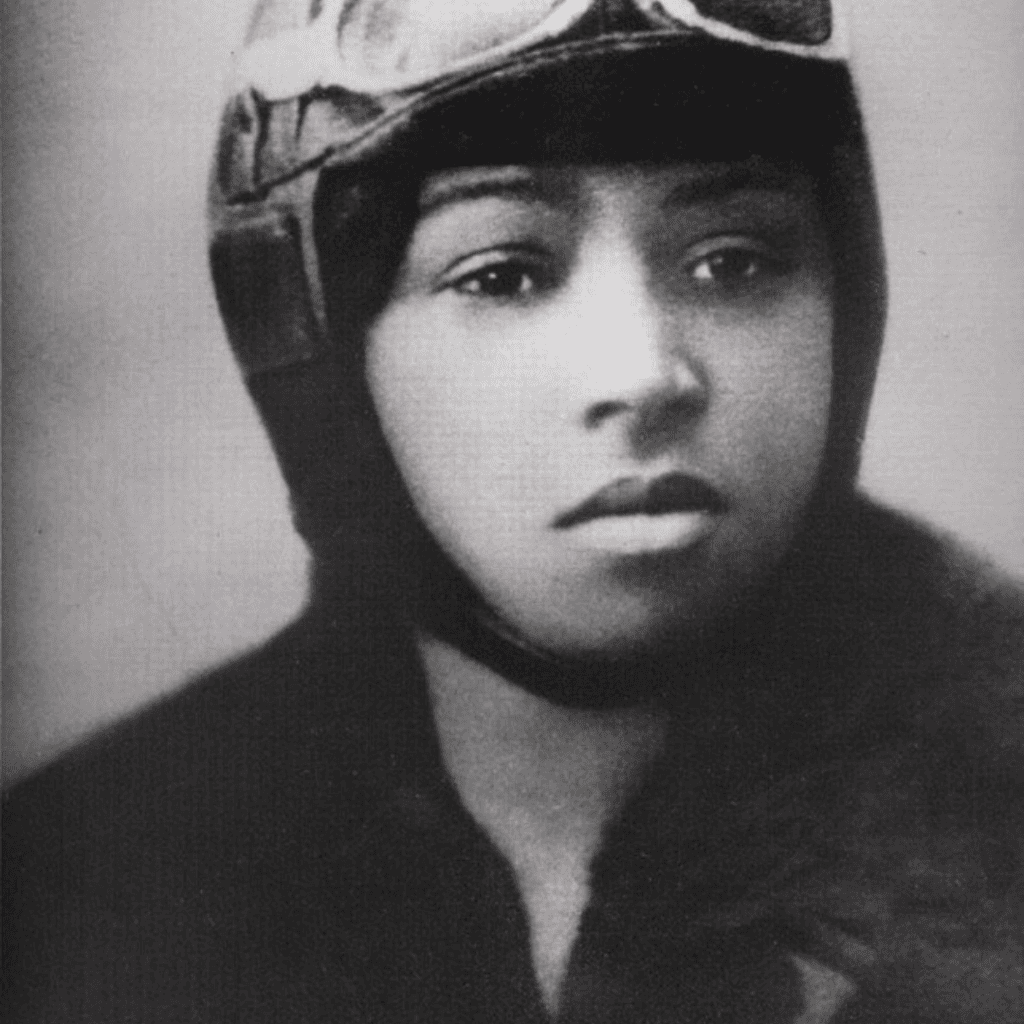
Bessie Coleman wears her pilot uniform. A photo from the Everett Collection in Canva. This is an inspirational story featuring Bessie Coleman, a black Native American pilot who broke the racial and gender barriers by achieving her goal of becoming the first black female pilot in 1921 in France. It has been 102 years since she received her licence and influenced black people to kickstart their careers in aviation.
Who is Bessie Coleman?
Bessie Coleman was born and raised in Texas on the 26th January, 1892 and grew up in a large family. Coleman was a bright student who excelled in Maths and helped her mother pick cotton since her parents were sharecroppers and washed laundry to earn income.
She studied at the Oklahoma Colored Agricultural and Normal University (now Langston) but she had to leave because of financial difficulties.
What did Bessie Coleman do for a living?
When she was 23, she moved to Chicago to live with her older brother and secured a job as a manicurist at a barbershop after completing her education at the Burnham School of Beauty Culture.
While she was working, her brother John Coleman came into the barbershop, who wasn’t fully sober teased her saying that French women were more liberated and were allowed to fly aeroplanes and he was right. It was in the barbershop that she decided to become a pilot.
How did she become a renowned pilot?
While living in Chicago, she made connections and befriended prominent black entrepreneurs such as Richard Abbott, a businessman and publisher of the Chicago Defender newspaper. Also, Jesse Binga, an entrepreneur who owned a bank and both businessmen played an essential role in ensuring she achieved her goal.
She applied for aviation schools in the USA and got rejected because of her race and gender, however, that didn’t stop her from learning how to fly.
It was Mr.Abbott who suggested that she should apply for a flight school in France since they were “less sexist and racist” and were more accepting of teaching and training French women to become pilots.
In the meantime, she applied for schools in France, switched jobs to become the manager of a restaurant to save money and took French lessons that were paid for by Jesse Binga.
A flight school called the Caudron Brothers School of Aviation in Le Crotoy in France accepted her application and she left in November 1920. She spent 7 months training as a pilot and was awarded the international licence by the Federation Aero Nautique Internationale in June 1921.
The air is the only place free from prejudices
-Bessie ColemanWhat happened after she became a pilot?
When she returned to America, she became a celebrity in the black community and became a stunt pilot. She returned to Europe to gain more experience and visited countries such as France, Netherlands and Germany before returning to America.
It was during this time that she became known as Queen Bess and became famous for barnstorming such as looping the loops and parachuting off the plane. Also, she toured the country and gave lectures to the black community.
How did she die?
She was rehearsing for an airshow in Florida and took her last flight with a mechanic called William Wills who was flying the Aeroplane.
According to the Independent, she was preparing to parachute off the plane when a wrench got caught in the engine and she was thrown out of the plane and didn’t survive the fall.
The mechanic didn’t survive the crash either as he lost control of the plane. She was only 34 years old and her ambition was to open a flight school so that black people could take flight lessons.
Over 5,000 people attended her funeral as they paid their last respects to the pioneering pilot. It was the journalist and activist Ida B. Wells who delivered her eulogy at the funeral.
Remembering Bessie Coleman
In 1929, William J. Powell, a black pilot started a flight school and called it Bessie Coleman Aviators Club in her honour. In 1977, black women started an aviation organisation called Bessie Coleman Aviators. It is important to not let race get in the way of your ambition.
I hope you enjoyed reading this article because I read a book about her and even though I have heard of her, I was inspired by her story and that she was passionate and determined to achieve her goals.
Let me know what you think of the blog post in the comments below, I appreciate the feedback and want to make sure that the content is intriguing. Don’t forget to share this blog post with other black women who are fascinated by black history and thank you for reading.
Reference
eBook: Bessie Coleman- First Female African-American and Native American Pilot by Cathleen Small.
Afro Lit Stories


Healing through storytelling, elevating black millenial women, one mindset shift at a time

